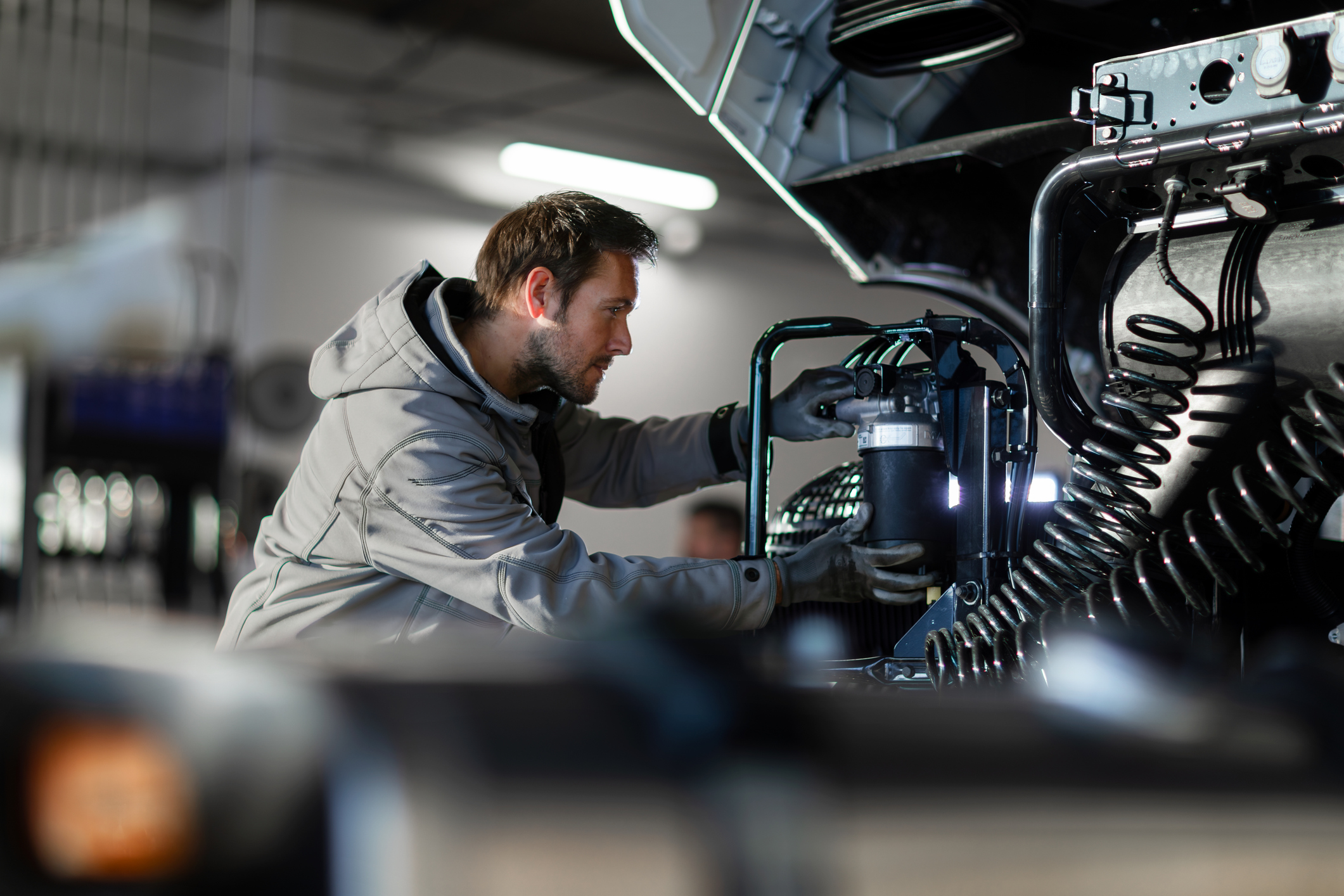
Book your service | Email: mga.repairs@gmail.com | Fax/Call us (02) 9708 4601
Book your service |
Email: mga.repairs@gmail.com |
Fax/Call us (02) 9708 4601
Blogs
Truck and Van Servicing: Why Preventative Maintenance Saves Money

In the competitive landscape of fleet management, keeping trucks and vans in pristine condition is not merely a matter of safety but a pivotal financial strategy. Preventative maintenance might initially appear as an additional expense, but in reality, it offers substantial financial savings over time. Let’s delve deeper into why regular truck and van servicing is an investment you cannot afford to overlook. For trusted servicing and fleet maintenance support, see MGA Motor Repairs.
What Is Preventative Maintenance?
Preventative maintenance encompasses regular and routine checks of vehicles to ensure they are operating optimally and to address potential issues before they escalate into major problems. This includes a wide range of activities such as oil changes, tire rotations, brake inspections, and other routine checks that are crucial for maintaining vehicle health. These checks are designed to catch issues early, thereby preventing costly repairs and ensuring consistent performance.
The philosophy behind preventative maintenance is rooted in the proactive approach to vehicle care. By addressing minor issues early on, fleet managers can prevent these problems from developing into larger, more expensive repairs. This not only saves money but also reduces the time vehicles spend out of service, which is critical for maintaining a productive fleet.
Why Should You Avoid Ignoring Small Problems?
Ignoring small problems can lead to significant repairs down the line, which can be both time-consuming and costly. For instance, neglecting a routine oil change may result in engine failure, a problem that is far more expensive to address. Preventative maintenance ensures that vehicles remain reliable, reduces downtime, and significantly extends their lifespan, thereby safeguarding the investment in these vehicles.
Furthermore, preventative maintenance is crucial for maintaining the operational efficiency of a fleet. Vehicles that are well-maintained are less likely to experience breakdowns, which can disrupt business operations and lead to lost revenue. By ensuring that vehicles are consistently in good working order, businesses can avoid unexpected costs and maintain a steady workflow.
How Does Preventative Maintenance Save Money?
One of the primary benefits of regular vehicle maintenance is its cost-effectiveness. By investing a small amount in maintenance today, businesses can avoid substantial repair bills in the future. This proactive approach is akin to investing in insurance to protect fleet assets, as it reduces the likelihood of unexpected repair costs and extends the useful life of the vehicles.
Moreover, regular maintenance allows businesses to budget more effectively. By anticipating maintenance costs, fleet managers can allocate funds more accurately and avoid financial surprises. This financial predictability is a significant advantage in managing a fleet’s overall expenses.
How Does Servicing Improve Safety?
Regular servicing is vital for ensuring that trucks and vans remain safe to operate. Well-maintained brakes, tires, and engines significantly reduce the risk of accidents, thereby protecting drivers and reducing the liability for the business. A commitment to safety through regular maintenance not only protects employees but also enhances the company’s reputation as a responsible operator.
In addition, regular maintenance can help identify potential safety issues before they become serious. By conducting thorough inspections, fleet managers can address problems such as worn brake pads or faulty tire alignment before they lead to accidents. This proactive approach to safety is an essential aspect of comprehensive fleet management.
Can Maintenance Improve Fuel Efficiency?
Vehicles that are kept in good condition run more efficiently, which means they consume less fuel. Regular maintenance checks can help identify issues such as clogged filters or misaligned tires, which may cause the vehicle to use more fuel than necessary. By maintaining optimal fuel efficiency, businesses can significantly reduce their operational costs.
Furthermore, improved fuel efficiency has environmental benefits. By reducing fuel consumption, businesses can lower their carbon footprint and contribute to environmental sustainability. This dual benefit of cost savings and environmental responsibility makes regular maintenance an essential practice for modern fleet management.
Why Are Oil Changes Essential?
Oil is the lifeblood of any engine, and regular oil changes are crucial for keeping engine parts lubricated, reducing wear and tear, and ensuring smooth operation. Consistent oil changes prevent the buildup of sludge and debris, which can impair engine performance and lead to costly repairs.
Regular oil changes also contribute to the longevity of the engine. By maintaining clean and effective lubrication, engine components experience less friction and wear, resulting in a longer lifespan and better overall performance. This simple maintenance task can have a significant impact on the reliability and efficiency of a vehicle.
Why Is Tyre Care Important?
Tires should be checked regularly for tread wear and proper inflation. Properly inflated tires improve fuel efficiency and ensure better handling and braking, reducing the risk of accidents. Regular tire rotations and alignments also contribute to even tread wear, which extends the life of the tires and enhances overall vehicle safety.
In addition to improving safety and efficiency, proper tire care can also lead to cost savings. By avoiding premature tire replacements and improving fuel economy, businesses can reduce their overall maintenance expenses. Tire care is a simple yet effective way to enhance the performance and safety of a fleet.
Why Inspect Brakes Regularly?
Brakes are a critical safety feature, and regular inspections are essential for preventing brake failure, which can be catastrophic for any vehicle. By identifying issues such as worn brake pads or leaking brake lines early, fleet managers can address these problems before they lead to accidents or expensive repairs.
Regular brake inspections also contribute to driver confidence and safety. By ensuring that brakes are in good working order, businesses can provide their drivers with the assurance that their vehicles are safe to operate. This commitment to safety is a key component of responsible fleet management.
Why Are Fluid Checks Necessary?
Various fluids such as coolant, transmission fluid, and brake fluid should be checked and replaced as needed. Keeping these fluids at the proper levels ensures optimal vehicle performance and prevents damage to critical components. Regular fluid checks can help identify leaks or other issues that may compromise vehicle reliability.
In addition to maintaining performance, regular fluid checks can also prevent costly repairs. By addressing fluid-related issues early, fleet managers can avoid damage to engines, transmissions, and other critical systems. This proactive approach to maintenance is essential for maximising the longevity and efficiency of a fleet.
Why Maintain Batteries?
Check batteries regularly to ensure they are charged and clean. A dead battery can lead to unexpected downtime and costly towing fees. Regular battery maintenance includes cleaning terminals, checking voltage, and replacing batteries as needed to ensure reliability.
Battery maintenance is particularly important for fleets operating in extreme weather conditions. Cold temperatures can reduce battery efficiency, while heat can accelerate battery wear. By conducting regular battery checks, businesses can avoid unexpected breakdowns and ensure that their vehicles remain operational in all conditions.
How Does Maintenance Reduce Downtime?
By maintaining your fleet regularly, you minimise unexpected breakdowns. This keeps your vehicles on the road longer, ensuring that your business operations remain smooth and profitable. Reduced downtime translates to increased productivity and the ability to meet customer demands without interruption.
Moreover, reduced downtime contributes to better customer satisfaction. By ensuring that vehicles are consistently available and reliable, businesses can provide timely and efficient services to their clients. This reliability is a key competitive advantage in the fleet management industry.
How Does It Extend Vehicle Lifespan?
Well-maintained vehicles last longer, allowing businesses to get more years of service from each truck and van. This maximises the investment in these vehicles and delays the need for costly replacements. By extending the lifespan of vehicles, businesses can allocate their financial resources more effectively and focus on growth and expansion.
Increased vehicle lifespan also contributes to sustainability. By reducing the frequency of vehicle replacements, businesses can minimise their environmental impact and reduce waste. This commitment to sustainability is increasingly important in today’s environmentally conscious market.
How Does Maintenance Improve Resale Value?
When it’s time to upgrade your fleet, well-maintained vehicles fetch a higher resale price. Buyers are willing to pay more for vehicles that come with a documented maintenance history. This increased resale value can offset the cost of new vehicle purchases and contribute to a more favorable financial position.
A strong resale value also enhances a company’s reputation in the market. By demonstrating a commitment to vehicle maintenance, businesses can build trust with potential buyers and partners. This reputation for reliability and responsibility is a valuable asset in the competitive fleet management industry.
How Do You Build a Maintenance Plan?
Work with your team to develop a maintenance plan that includes regular inspections, servicing, and repairs. Schedule these activities in advance to ensure they are completed on time. A well-structured maintenance plan provides a roadmap for maintaining vehicle health and optimising fleet performance.
A comprehensive maintenance plan also facilitates communication and collaboration within the team. By clearly outlining responsibilities and schedules, businesses can ensure that all team members are aligned and working towards the common goal of maintaining a reliable and efficient fleet.
Can Software Help with Maintenance?
Consider using fleet management software to track maintenance schedules and alerts. These tools can help you stay on top of servicing needs and ensure nothing falls through the cracks. Fleet management software provides real-time data and insights, enabling businesses to make informed decisions and optimise their maintenance strategies.
In addition to tracking maintenance schedules, fleet management software can also provide valuable analytics and reporting. By analysing maintenance data, businesses can identify trends, anticipate future needs, and continuously improve their fleet management practices. This data-driven approach is essential for maintaining a competitive edge.
Why Involve Drivers in Maintenance?
Educate your drivers about the importance of vehicle maintenance. Encourage them to report any issues promptly and provide them with a checklist to conduct basic inspections. Driver involvement is crucial for identifying potential problems early and ensuring that vehicles are well-maintained.
Training drivers also fosters a culture of safety and responsibility within the organisation. By empowering drivers to take an active role in vehicle maintenance, businesses can enhance safety, reduce costs, and improve overall fleet performance. This collaborative approach is a key element of successful fleet management.
Conclusion
Preventative maintenance is not just a good practice; it is a necessity for any fleet manager who wants to save money and ensure the safety and reliability of their vehicles. By investing in regular truck and van servicing, you protect your assets, improve efficiency, and ultimately increase your bottom line. Don’t wait for problems to arise, take proactive steps to keep your fleet in peak condition today. In doing so, you not only safeguard your investment but also position your business for long-term success in the competitive fleet management landscape. For expert servicing and preventative fleet care, trust MGA Motor Repairs.
Share this article
Recent Blogs
- All Posts



